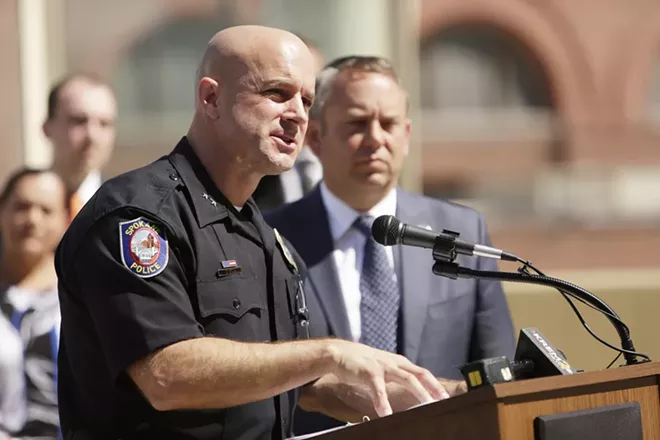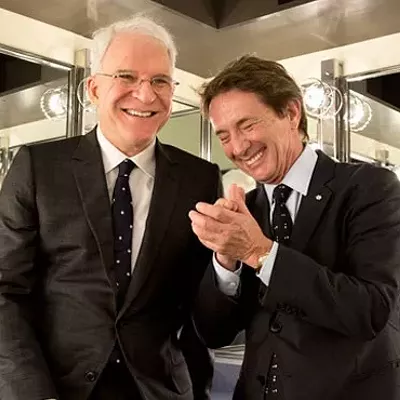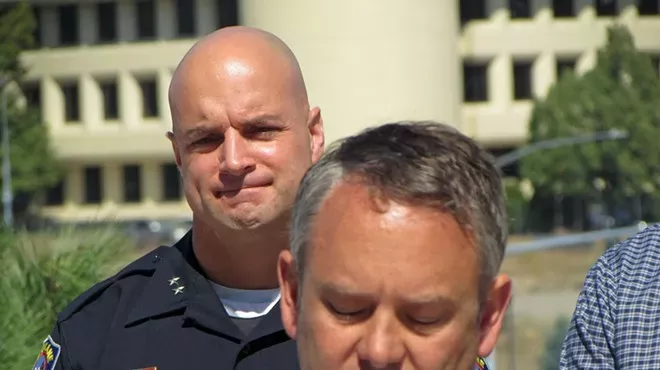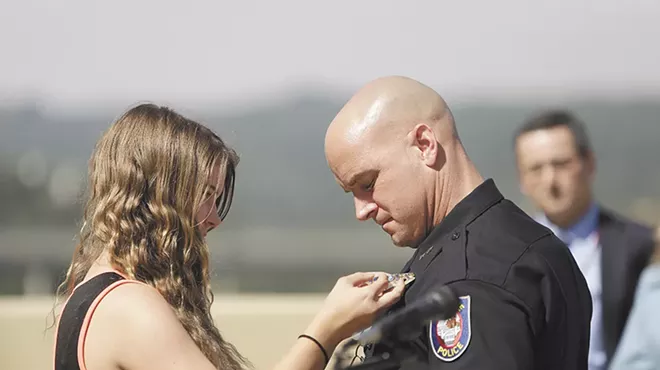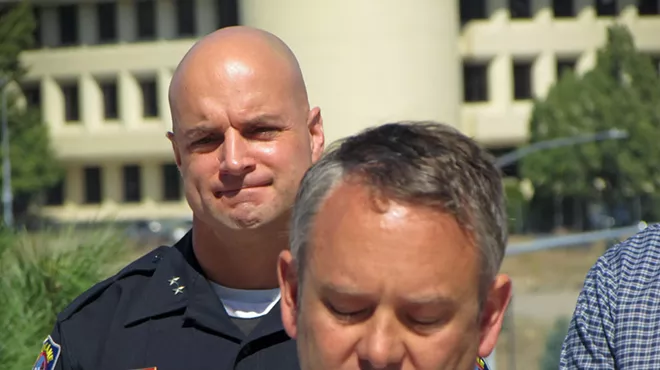Friday, August 12, 2016
The 10 best questions community members asked Chief Craig Meidl
Before anyone asked a question, Craig Meidl addressed the two biggest issues on the minds of most.
The Salute and the Email.
A crowd of about 150 people gathered in the West Central Community Center, where weeks before Mayor David Condon introduced the two top candidates for police chief, which did not include Meidl. Condon discarded those candidates and chose Meidl, who did not apply for the job. Condon did not ask for approval from city council, as required by city law, and Councilwoman Lori Kinnear proposed a vote and scheduled two community forums in an attempt to add some legitimacy to Meidl's nomination.
Last night, Meidl explained why he was one of the officers who stood and saluted former Officer Karl Thompson as he was escorted from a federal courtroom and why he sent an email expressing sympathies for his disgraced colleague. Thompson was convicted in federal court of excessive force and lying to investigators in the 2006 death of Otto Zehm.
Meidl explained, as he has before, that the salute was spontaneous and not meant to be disrespectful to Zehm or his family, some of whom sat in the courtroom near the saluting officers.
The email, sent to about 80 people in the department, expressed frustration with Thompson's conviction and the justice system. Meidl said he was trying to capture the thoughts he'd heard from officers surrounding the trial and conviction. He was trying to be supportive during a time when a "black cloud" had been lingering over the department for years.
Phrases like "An innocent man was found guilty. People happy over someone who risked his life every day to protect them. They turned on him. They turned on us. We have to look out for each other; no one else cares about what happens to us," had some in the community especially concerned.
For the remaining 90 minutes, several community members fired questions at Meidl. Below, we've selected 10 of the best (questions and answers have been paraphrased or edited for brevity).
1. Your email included phrases like "an innocent man was found guilty," "the system failed," and you expressed feeling "betrayed by the public." To me, this shows an "us vs. them" attitude. Does that still exist and how will you address it?
Craig Meidl: No. it absolutely does not. That was to acknowledge the pain that was going on and everything that was going on within the department.
A police department really is only going to be as successful as a community is willing to work with them. If you alienate the community then you're not going to have an effective police department. And you can see it across the country where the citizens feel alienated and you have riots, burning buildings, and a tremendous amount of violence. For that to stop, both sides have to sit down and be willing to talk. So we are not there, but we are actually ahead of some of these other cities.
2. You've apologized for the salute, but dozens of other officers haven't. Will you ask them to also apologize to address the lingering hurt?
Meidl: It's something we can consider. But this department lived under that cloud for so long, I think most of the officers are trying to move forward. It has been covered so much in the media and it's such a sore wound for the community and the Zehm family, but also for the Spokane Police Department.
When do you say "we're moving forward?" I think there are so many in the department who want to move forward and don't want that to be their legacy.
3. Mayor David Condon went through a fairly lengthy process and gathered much public input to produce two candidates, but then opted to disregard that input. You did not go through the same public vetting process. How did you then make the decision to accept the mayor's appointment under those circumstances? Does that not de-legitimize your appointment?
Meidl: I agree with what you're saying, and I've heard that from quite a few different people.
This is what I've heard: the community overall felt that both of the candidates were good, but didn't feel like they were going to be a good fit. So the mayor asked me if I would consider that position. After doing a lot of prayer, talking with my family, I told him yes.
Having said that, I acknowledge your concern. Part of police legitimacy is process. So what I'm trying to do is help with that process by asking to be confirmed and agreeing to community forums.
4. In your first 100 days, what are your priorities in regard to civilian oversight?
Meidl: The Department of Justice recommended that the police ombudsman attend our deadly force review panel and use of force review board. Let me explain: If we get involved in a shooting, we investigate for violations of policy, so that's what the deadly force review panel is. Then you have another review process, which is past the policy violation stage. You're looking at it through more of a response lens of tactics, strategy, equipment, supervision, communication. So two separate review boards look at any officer involved shooting.
(The ombudsman is currently not included on the second review by the Administrative Review Panel.)
So we absolutely want to get those recommendations signed off by the unions. That's gotta be the first priority.
5. Why didn't you apply to be police chief?
Meidl: I wanted to avoid being in a position where if we went with an outside chief, now the assistant chief competed for that position. And we can all be professional, but at some level, if you're a chief coming in and you know you competed against the person who is the assistant chief, there's always going to be this little nagging doubt in your mind: "Are you going to try to embarrass me because you wanted this position?" So to remove any doubt about that, I wanted to avoid that entire spectrum of concern.
6. Because of the prolific use in our community of heroin, meth and prescription pills that lead to many arrests for possession of controlled substance, are you supportive of law enforcement assisted diversions to get people into treatment?
Meidl: Absolutely. But one of the problems we have is a lack of services.
I remember when I was the north precinct captain, there was a call of an individual acting erratically scaring customers, and I responded. This individual was high on meth. He even admitted that. So I asked him about treatment, and he was interested. He wanted to go that minute, but it's a two-month delay to get in, and in two months, he's not interested anymore. So I 100 percent embrace law enforcement assisted diversion. But we have to have the services to support that.
7. How would you respond to a female officer who says she's been sexually harassed by another officer?
Meidl: Immediately open an investigation. Typically human resources will investigate sexual harassment complaints and ask if they need to transfer somebody out of a position. First priority is to keep the separate. Then you go through the investigation process, and that can take weeks to get interviews lined up and so forth.
8. Do you believe the police ombudsman needs more authority to conduct investigations? Are you willing to pressure the administration to do that and will you include the community in efforts?
Meidl: I don't get the sense, from my conversation with (Bart) Logue, the ombudsman, that he needs more authority. He's authorized to send back a case he doesn't agree with, and can sit in on internal affairs interviews and ask questions that the investigator doesn't ask.
My sense is that he can get the information he wants by compelling the department to re-interview and ask questions that he feels did not address the issues, or he can compel them to interview other people that IA did not interview.
My sense is that he actually has a fair amount of ability to compel interviews and questions.
9. How would you define success within the Spokane Police Department and what does that look like?
Meidl: Maybe when I'm seeing our officers consistently dealing with people how they want to be treated, maybe that's an indication. But I don't know. I hope that when I get there I'll know, but I don't know what it will take for me to think we're there. That's a good question.
10. Why should we trust your apology when it only comes years after the salute and when you stand to gain something?
Meidl: You don't get to call press conferences as an assistant chief, a captain, a major, a lieutenant. That's the chief's job.
So the discussion with the Zehm's actually occurred in February, and I believed at that time that Rick Dobrow as going to be the chief indefinitely. So there was no ulterior motive. I did it because it was the right thing to do and quite frankly it's the Christian thing to do. I never had that conduit until the mayor, who has a relationship with the Zehm family, facilitated that meeting.
And as far as trust: it's slowly gained and quickly lost. I fully acknowledge that I'm going to have to spend every day trying to regain that trust.
This post has been updated to accurately reflect the ombudsman's role on use of force review (question No. 4).
Tags: Spokane Police Department , Craig Meidl , News , Image

